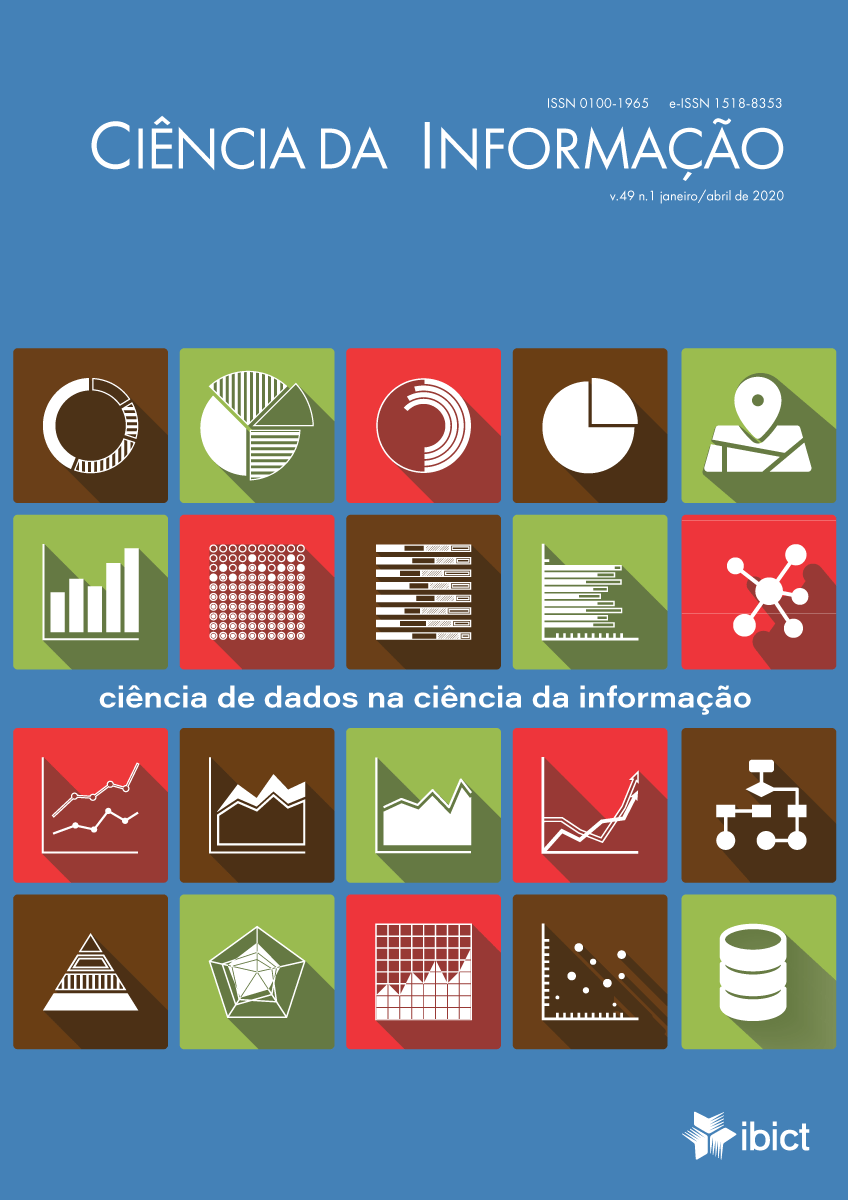Bibliographic and epistemological exchanges between data science and information science
DOI:
https://doi.org/10.18225/ci.inf.v49i3.5655Keywords:
Big data, Libray and information science, Analysis of co-occurrences, Bibliographic coupling, Professional developmentAbstract
In view of the great recent evidence achieved by methods, tools and practices of data science, the article verifies the possibility that there are new foundations in a supposed science called Data Science, and how this Science would impact or be impacted by Information Science. The methodology is exploratory, and uses bibliographic research based on analysis of networks of co-occurrences and bibliographic coupling involving the terms “data science”, “information science” and “library and information science”. The exchanges and contributions of the two fields of practices, evidenced by the analyzes produced, as well as some epistemological implications, point not only to an opportunity for exchanges, but to a need for them to occur as soon as possible.
Downloads
References
BIRKHOFER, Herbert (Org.). The Future of Design Methodology. London: Springer-Verlag, 2011.
BROWN, Tim. Change by Design: How Design Thinking Transforms Organizations and Inspires Innovation. USA: Harper Collins, 2009.
BUCKAND, Michael. The physical, mental and social dimensions of documents. Proceedings from the Document Academy, v. 3, n. 1, p. 4(1-6), 2016.
CHEN, Hsin-liang; ZHANG, Yin. Educating Data Management Professionals: A Content Analysis of Job Descriptions. Journal of Academic Librarianship, v. 43, n. 1, p. 18–24, 2017.
DAVENPORT, Thomas H.; PATIL, D.J. Data Scientist: The Sexiest Job of the 21st Century. Harvard Business Review, v. 90, n. 10, p. 70–76, 2012.
KAZAKCI, Akin Osman. Data science as a new frontier for design. In: WEBER, C.; HUSUNG, S.; CANTAMESSA, M.; et al (Orgs.). Iced 15, Vol 10: Design Information and Knowledge Management. Glasgow: Design Soc, 2015.
NUEST, Daniel; GRANELL, Carlos; HOFER, Barbara; et al. Reproducible research and GIScience: an evaluation using AGILE conference papers. Peerj, v. 6, p. e5072, 2018.
ORTIZ-REPISO, Virginia; GREENBERG, Jane; CALZADA-PRADO, Javier. A cross-institutional analysis of data-related curricula in information science programmes: A focused look at the iSchools. Journal of Information Science, v. 44, n. 6, p. 768–784, 2018.
SHEBLE, Laura. Research Synthesis Methods and Library and Information Science: Shared Problems, Limited Diffusion. Journal of the Association for Information Science and Technology, v. 67, n. 8, p. 1990–2008, 2016.
SI, Li; ZHUANG, Xiaozhe; XING, Wenming; et al. The cultivation of scientific data specialists Development of LIS education oriented to e-science service requirements. Library Hi Tech, v. 31, n. 4, p. 700–724, 2013.
VAN ECK, Nees Jan; WALTMAN, Ludo. Software survey: VOSviewer, a computer program for bibliometric mapping. Scientometrics, v. 84, n. 2, p. 523–538, 2010.
VIRAPONGSE, Arika; DUERR, Ruth; METCALF, Elizabeth Covelli. Knowledge mobilization for community resilience: perspectives from data, informatics, and information science. Sustainability Science, v. 14, n. 4, p. 1161–1171, 2019.
WANG, Lin. Twinning data science with information science in schools of library and information science. Journal of Documentation, v. 74, n. 6, p. 1243–1257, 2018.
ZINS, Chaim. Knowledge map of information science. Journal of the American Society for Information Science and Technology, v. 58, n. 4, p. 526–535, 2007.
Downloads
Published
Issue
Section
License
Copyright (c) 2021 Jorge Henrique Cabral Fernandes

This work is licensed under a Creative Commons Attribution-ShareAlike 4.0 International License.
- This publication reserves the right to modify the original, regarding norms, spelling and grammar, in order to maintain the standards of the language, still respecting author writing style;
- The final proofs will not be sent to the authors;
- Published works become Ciência da Informação's property, their second partial or full print being subject to expressed authorization by IBICT's Director;
- The original source of publicaton must be provided at all times;
- The authors are solely responsible fo the views expressed within the article;
- Each author will receive two hard copies of the issue, if made availalbe in print.




























